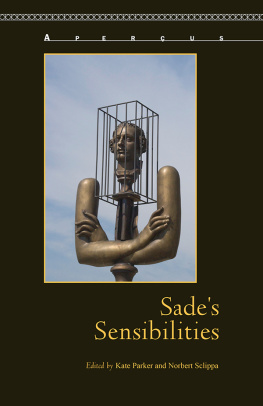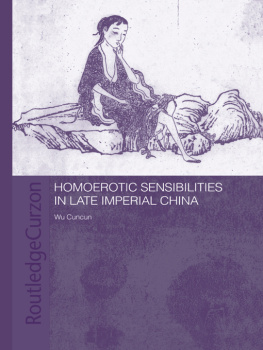Parker Kate - Sades Sensibilities
Here you can read online Parker Kate - Sades Sensibilities full text of the book (entire story) in english for free. Download pdf and epub, get meaning, cover and reviews about this ebook. City: Lewisburg, year: 2015;2014, publisher: Bucknell University Press;Lanham, genre: Detective and thriller. Description of the work, (preface) as well as reviews are available. Best literature library LitArk.com created for fans of good reading and offers a wide selection of genres:
Romance novel
Science fiction
Adventure
Detective
Science
History
Home and family
Prose
Art
Politics
Computer
Non-fiction
Religion
Business
Children
Humor
Choose a favorite category and find really read worthwhile books. Enjoy immersion in the world of imagination, feel the emotions of the characters or learn something new for yourself, make an fascinating discovery.
- Book:Sades Sensibilities
- Author:
- Publisher:Bucknell University Press;Lanham
- Genre:
- Year:2015;2014
- City:Lewisburg
- Rating:4 / 5
- Favourites:Add to favourites
- Your mark:
- 80
- 1
- 2
- 3
- 4
- 5
Sades Sensibilities: summary, description and annotation
We offer to read an annotation, description, summary or preface (depends on what the author of the book "Sades Sensibilities" wrote himself). If you haven't found the necessary information about the book — write in the comments, we will try to find it.
Sades Sensibilities — read online for free the complete book (whole text) full work
Below is the text of the book, divided by pages. System saving the place of the last page read, allows you to conveniently read the book "Sades Sensibilities" online for free, without having to search again every time where you left off. Put a bookmark, and you can go to the page where you finished reading at any time.
Font size:
Interval:
Bookmark:
Sades Sensibilities
A perus: Histories Texts Cultures
a B ucknell series
Series Editor: Greg Clingham
Aperu (apers). 1882. [Fr.] A summary exposition, a conspectus.
Relations among historiography, culture, and textual representation are presently complex and rich in possibilities. Aperus is a series of books exploring the connections between these crucial terms. Revisionist in intention, Aperus seeks to open up new possibilities for humanistic knowledge and study, and thus to deepen and extend our understanding of what history, culture, and texts have been and are, as these terms are made to bear on each other by new thinking and writing.
Titles in the Series
History and Nation
ed. Julia Rudolph
Europe Observed: Multiple Gazes in Early Modern Encounters
ed. Kumkum Chatterjee and Clement Hawes
Beyond Douglass: New Perspectives on Early African American Literature
ed. Michael J. Drexler and Ed White.
The Patient
ed. Kimberly Myers and Harold Schweizer
Masculinity, Senses, Spirit
ed. Katherine M. Faull
Freedom of Speech: The History of an Idea
ed. Elizabeth Powers
Scotland As Science Fiction
ed. Caroline McCracken-Flesher
Encountering China: Early Modern European Responses
ed. Rachana Sachdev and Qingju Li
Sades Sensibilities
ed. Kate Parker and Norbert Sclippa
Storytelling in Science and Literature
ed. Margery Arent Safr
Sades Sensibilities
Edited by
Kate Parker and Norbert Sclippa

Lewisburg: Bucknell University Press
Published by Bucknell University Press
Co-published with Rowman & Littlefield
4501 Forbes Boulevard, Suite 200, Lanham, Maryland 20706
www.rlpgbooks.com
Unit A, Whitacre Mews, 26-34 Stannary Street, London SE11 4AB
Copyright 2015 by Rowman & Littlefield
All rights reserved . No part of this book may be reproduced in any form or by any electronic or mechanical means, including information storage and retrieval systems, without written permission from the publisher, except by a reviewer who may quote passages in a review.
British Library Cataloguing in Publication Information Available
Library of Congress Cataloging-in-Publication Data
Sades Sensibilities / edited by Kate Parker and Norbert Sclippa.
pages cm. (Aperus: Histories Texts Cultures)
Includes bibliographical references and index.
ISBN 978-1-61148-646-9 (cloth : alk. paper) ISBN 978-1-61148-648-3 (pbk. : alk. paper)ISBN 978-1-61148-647-6 (electronic) 1. Sade, marquis de, 1740-1814Criticism and interpretation. I. Parker, Kate, 1980- editor. II. Sclippa, Norbert, 1944 editor.
PQ2063.S3S186 2015
843'.6dc23
2014035988
 The paper used in this publication meets the minimum requirements of American National Standard for Information SciencesPermanence of Paper for Printed Library Materials, ANSI/NISO Z39.48-1992.
The paper used in this publication meets the minimum requirements of American National Standard for Information SciencesPermanence of Paper for Printed Library Materials, ANSI/NISO Z39.48-1992.
Printed in the United States of America
Acknowledgments
Working on Sade can be an isolating endeavor, but we are fortunate to have found a supportive (even friendly) community of scholars nestled within these pages. The editors would first like to thank Greg Clingham, Pamelia Dailey, and the editorial board of the Bucknell University Press for their tireless support of this project, from its nascent stages to publicationhappily, just in time to celebrate the bicentennial of D.A.F. de Sades death. Particular thanks must also go to the Presss anonymous reader, whose meticulous and thorough reports improved the volume substantially and helped us to find its final shape and focus. Above all, we remain grateful to our contributors for offering us these exciting and insightful readings of Sade with which to work: thank you. A hearty thanks must also be extended to our respective institutions for their continued support of our work on Sade: Norbert thanks the College of Charleston and Kate thanks the University of Wisconsin-La Crosse. Finally, our most effusive mercis belong to our families: many thanks for your enthusiasm and love.
Sades Sensibilities
Kate Parker
I ntroduction
Sadean Sensibilities
On December 2, 1814, Donatien Alphonse Franois de Sade otherwise known as the divin Marquis , disavowed author of Les Infortunes de la vertu (1787), La Philosophie dans le boudoir (1795), and La Nouvelle Justine (1799) among other important works of literature, philosophy, and literary criticismdied in his sleep in the asylum at Charenton. At the time of his death, he had spent more than thirty yearsnearly halfof his life in prison for crimes ranging from blasphemy to sodomy to penning obscenities. In his youth he had reveled in ostentatious, orgiastic parties in his chteau at Lacoste; in his later years, he had assumed the pedestrian title of Citoyen Sade and had become (laughably, even to his own mind) a judge among the revolutionaries in Paris. He had endured extreme hardships and the most immense and sumptuous comforts. A lack of exercise and love of sweets had made him massively obese by his forties, yet he was still able to seduce a young single mother who remained a loving, loyal companion until his death. Perhaps not unexpectedly, this Sadeor, more properly, a mythic, romanticized, demonstrably slimmer version of this Sadewas destined to become one of the most enduring and most controversial figures of the European Enlightenment. He would inspire, in turn, nihilists, surrealists, post-structuralists, and feminists. He would infuseor, some would say, infectart, film, literature, and philosophy through the nineteenth and twentieth centuries. For the past two hundred years, Sade has embodied libertinage dissoluteness, and licentiousness, certainly, but also in its nominal sense of free-thinking ( OED )yet this concept has also circumscribed critical approaches to Sades wide-ranging and diverse oeuvre , particularly those engaged in what might be called a recovery of Sades sensibilities. This volume interrogates Sades libertinage, both as a twentieth-century critical construct and as an eighteenth-century precept. The essays in Sades Sensibilities explore how the labels of radical and libertine have both energized and restricted Sade studies, how readings that emphasize Sade as a historically-situated writer and thinker have rarely come into contact with those celebrating the transformative and imaginative qualities of his texts. This volume seeks to bring together work that rigorously engages Sades radicalism and also that resists the tendency to ostracize him from the broader historical and philosophical currents of the Enlightenmentparticularly those of sensibility, affect, and feeling. We also still wish to allow for those accounts of Sade that see him as an anomaly, an outsidercriticism which continues to underscore the impenetrability of his texts and the ways in which his thinking transcends the long eighteenth century. Sades Sensibilities , then, combines readings of Sade as the consummate radical with an important counter-portraitthat supplied by historicist criticismwhich sees Sade as much a product of the Enlightenment as he is its most notorious deviant. Rather than increasingly segregate these two approaches to Sade, our volume brings them into closer and more intimate conversation.
Gilles Deleuze has famously called Sade cold and cruelapathetic, removed, distantand it is this portrayal of the Sadean libertine with which we are most often familiar: a villainous agent, driven only by the pleasure of demonstrative reason, deriving satisfaction and pleasure from the violently repetitive exercise of his own emotional indifference and intellectual distance. The concept of apathy has been strongly associated with a specifically Sadean strain of libertinage: Sades libertines are particularly, hideously violent, seemingly immune to the torture they inflict. Reading Sade in this way makes him into an extreme proponent of the Enlightenment individualthe perpetually self-centered anti-hero, calculated and cruel. But, as others ask, is the view of Sade as the extreme culmination of Enlightenment thought too limiting, too narrow? Given how our understanding of the philosophy and literature of the eighteenth century has radically shifted over the course of the past few decadescarving open a unified Enlightenment to see how it pieces together pure rationality with raw sentiment, how it emphasizes the communal as well as the alienation of the individual Sades Sensibilities also offers the possibility of a different, and by some accounts significantly less radical Sade, one who finds resonance with eighteenth-century discourses of sentimentality and feeling as well as those of alterity and alienation. Indeed, other versions of Sade are not only possible, but meaningful, as the essays in Part II testify: Sades Sensibilities uncovers an author striving to connect as much as he aims to estrange, who is as much defined by the communities of beings and things that he constructs in his texts as he is by the cold and cruel libertines who sit, all-consumingly, at their center. Just as Sade might once have been seen by some as the extreme embodiment of Enlightenment principlesideals gone too far, abstractions transformed into perversionsso too does he nestle himself within some of the most traditional and treasured narratives of the late eighteenth-century turn to modernity, including those narratives of sociability and rational feeling. And the essays engage this possibility throughout the volume: Norbert Sclippa reads the Sadean text as a catalogue of proliferating passions; John Phillips imagines La Philosophie dans le boudoir as a visceral response to the encroaching stench of guillotine blood in mid-1790s Paris; and Caroline Warman unfolds the epicurean possibilities of incarnated philosophy in the libertine figure.
Next pageFont size:
Interval:
Bookmark:
Similar books «Sades Sensibilities»
Look at similar books to Sades Sensibilities. We have selected literature similar in name and meaning in the hope of providing readers with more options to find new, interesting, not yet read works.
Discussion, reviews of the book Sades Sensibilities and just readers' own opinions. Leave your comments, write what you think about the work, its meaning or the main characters. Specify what exactly you liked and what you didn't like, and why you think so.











